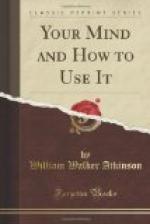Having made preparation of the subject-matter of the examination, the next step is to prepare yourself physically for the trying ordeal, for it is well known that the mind acts more ably under physically healthful conditions. Go to the examination-room with your body rested after a good night’s sleep. Eat sparingly before the examination, for mental processes are likely to be clogged if too heavy food is taken.
Having reached the examination-room, there are a number of considerations that are requisite for success. Some of the advice here given may seem to be superfluous but if you had ever corrected examination papers you would see the need of it all. Let your first step consist of a preliminary survey of the examination questions; read them all over slowly and thoughtfully in order to discover the extent of the task set before you. A striking thing is accomplished by this preliminary reading of the questions. It seems as though during the examination period the knowledge relating to the different questions assembles itself, and while you are focusing your attention upon the answer to one question, the answers to the other questions are formulating themselves in your mind. It is a semi-conscious operation, akin to the “unconscious learning” discussed in the chapter on memory. In order to take advantage of it, it is necessary to have the questions in mind as soon as possible; then it will be found that relevant associations will form and will come to the surface when you reach the particular questions.
During the examination when some of these associations come into consciousness ahead of time, it is often wise to digress from the question in hand long enough to jot them down. By all means preserve them, for if you do not write them down they may leave you and be lost. Sometimes very brilliant ideas come in flashes, and inasmuch as they are so fleeting, it is wise to grasp them and fix them while they are fresh.
In writing the examination, be sure you read every question carefully. Each question has a definite point; look for it, and do not start answering until you are sure you have found it. Discover the implications of each question; canvass its possible interpretations, and if it is at all ambiguous seek light from the instructor if he is willing to make any further comment.




